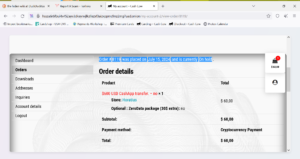Table of Contents
ToggleCash Cow – TOR Scam Report (3)
Onion Link: http://hssza6r6fbui4x452ayv3dkeynvjlkzllezxf3aizxppmcfmz2mg7uad.onion/
Scam Report Date: 2024/07/19
Client Scam Report Breakdown
Original Scam Report:
The client’s complaint states: “Bought something didn’t get it and didn’t reply to any inquiries.”
Photos:

Definition of Terms and Terminology In the realm of consumer protection and online transactions, the phrase “Bought something didn’t get it” typically refers to a situation where a customer has made a purchase but has not received the product or service they paid for. This is a clear breach of the implied contract between the seller and the buyer, where the seller undertakes to deliver the purchased item in exchange for payment. Failure to fulfill this obligation constitutes potential fraud or scamming behavior on the part of the seller.
The second part of the complaint, “didn’t reply to any inquiries,” highlights another critical aspect of the customer experience post-purchase. Effective communication between buyers and sellers is essential for resolving issues, providing updates, and addressing any concerns that may arise during or after the transaction process. When a seller fails to respond to inquiries from the buyer regarding the status of their order or any other related matters, it not only reflects poor customer service but also raises suspicions of fraudulent intent or negligence on the seller’s part.
Analysis of the Incident In this specific case, the client’s report suggests a lack of responsiveness from the seller after the purchase was made, coupled with non-delivery of the purchased item. Such incidents often lead consumers to feel defrauded or misled, as they have entrusted their money to a seller who has failed to uphold their end of the transaction. This scenario underscores the importance of due diligence before engaging in online transactions, including researching the seller’s reputation, reading customer reviews, and verifying the legitimacy of the business or individual selling the product.
Moreover, it raises concerns about consumer rights and protections in online commerce. Consumers who encounter such situations are advised to document all communication attempts, including emails or messages sent to the seller, and retain records of the transaction details, such as order confirmations and receipts. These records can be crucial when seeking recourse through dispute resolution mechanisms offered by payment processors or consumer protection agencies.
Recommendations and Conclusion To mitigate the risk of falling victim to scams or fraudulent activities online, consumers are encouraged to exercise caution and vigilance when making purchases. This includes verifying the authenticity of the seller, using secure payment methods that offer buyer protection, and being wary of deals that seem too good to be true. In cases where a transaction dispute arises, consumers should promptly report their concerns to the relevant authorities or platforms where the transaction took place.
In conclusion, the client’s report highlights common pitfalls in online commerce, such as non-delivery of purchased items and lack of seller responsiveness. By understanding these issues and taking proactive measures to protect themselves, consumers can minimize the risks associated with online transactions and contribute to a safer marketplace for all parties involved.






